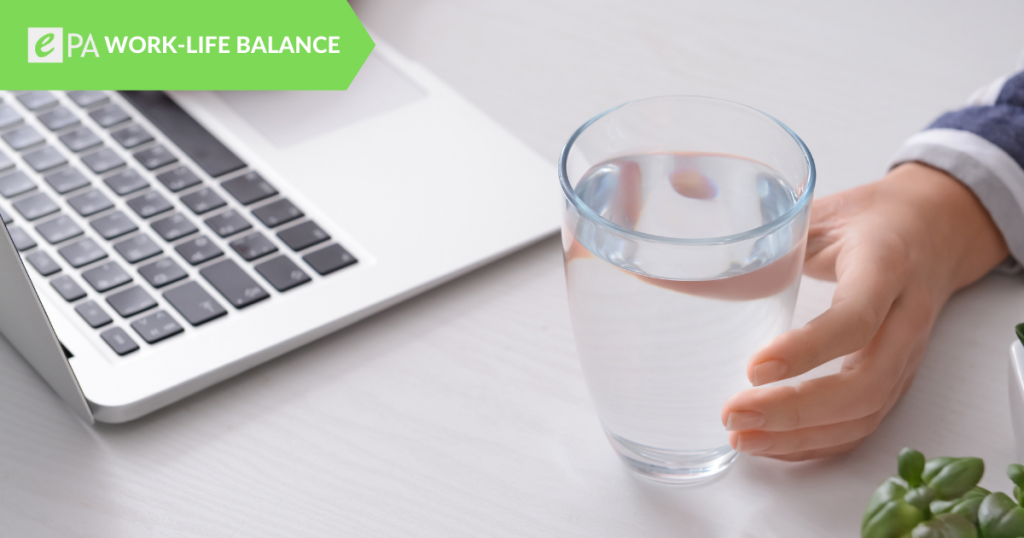
We all know how easy it is to forget something as basic as stopping to have a drink, especially when you are at work, but staying properly hydrated is essential.
Our bodies are around 60% water, and we should be drinking at least 1.8-2L (8-10 glasses) of water, daily, in order to maintain this level. In this e-PA: Work-Life Balance entry, we will explore 7 science-based reasons why:
Improved Brain Function & Energy Levels
Research has shown that even mild dehydration (-1-3% body weight) can impair energy levels, lower your mood, and lead to major reductions in memory and brain performance.
In a study of young women, researchers found that fluid loss of 1.4% after exercise impaired both mood and concentration. It also increased the frequency of headaches. Many members of this same research team conducted a similar study in young men. They found that fluid loss of 1.6% was detrimental to working memory and increased feelings of anxiety and fatigue.
A fluid loss of 1–3% equals about 1.5–4.5 pounds (0.5–2kg) of body weight loss for a person weighing 150 pounds (68kg). This can easily occur through normal daily activities, let alone during exercise or higher temperatures. Many other studies, with subjects ranging from children to older adults, have shown that mild dehydration can impair mood, memory, and brain performance.
Increased Physical Performance
Losing as little as 2% of your body’s water content can significantly impair your physical performance.
This is particularly important during intense exercise or high heat, and it isn’t uncommon for athletes to lose as much as 6-10% of their water weight via sweat. This can lead to altered body temperature control, reduced motivation, and increased fatigue. It can also make exercise feel much more difficult, both physically and mentally.
Optimal hydration has been shown to prevent this from happening, and it may even reduce the oxidative stress that occurs during high intensity exercise. This isn’t surprising when you consider that muscle is about 80% water. If you exercise intensely and tend to sweat, staying hydrated can help you perform at your absolute best.
Helps Prevent & Treat Headaches
Dehydration can trigger headaches and migraines, in some individuals.
Research has shown that a headache is one of the most common symptoms of dehydration. In fact, studies have shown that up to 40% of individuals suffer from headaches, when poorly hydrated. What’s more, it has also been shown that drinking water can help relieve headaches in those who experience frequent headaches.
A study of 102 men found that drinking an additional 1.5L of water per day resulted in significant improvements on the ‘Migraine-Specific Quality of Life scale’, a scoring system for migraine symptoms. Plus, 47% of the men who drank more water reported headache improvement, while only 25% of the men in the control group reported this effect.
However, it must be stated that not all studies agree, and researchers have concluded that, because of the lack of high-quality studies, more research is needed to confirm how increasing hydration may help improve headache symptoms and decrease headache frequency.
May Help Relieve Constipation
Drinking plenty of water may help prevent and relieve constipation, especially in people who generally don’t drink enough water.
Constipation is a common problem that’s characterised by infrequent bowel movements and difficulty passing stool. Increasing fluid intake is often recommended as a part of the treatment protocol, and there’s some evidence to back this up.
Low water consumption appears to be a risk factor for constipation in both younger and older individuals. Mineral water may be particularly beneficial for those with constipation, as studies have shown that mineral water that’s rich in magnesium and sodium improves bowel movement frequency and consistency, in people with constipation.
Helps Prevent Hangovers
A hangover refers to the unpleasant symptoms experienced after drinking alcohol.
They are partly caused by dehydration, and drinking water can help reduce some of their main symptoms.
Alcohol is a diuretic, so it makes you lose more water than you take in. This can lead to dehydration. Although dehydration isn’t the main cause of hangovers, it can cause symptoms like thirst, fatigue, headache, and dry mouth.
Good ways to reduce hangovers are to drink a glass of water between drinks and have at least one big glass of water before going to bed.
Helps Weight Loss
Drinking plenty of water can help you lose weight.
This is because water can decrease hunger and boost your metabolic rate.
Some evidence suggests that increasing water intake can promote weight loss by slightly increasing your metabolism, which can increase the number of calories you burn on a daily basis.
A 2013 study in 50 overweight young women demonstrated that drinking an additional 500ml of water, 3 times per day before meals, for 8 weeks, led to significant reductions in body weight and body fat compared with their initial measurements.
The timing is important, also. Drinking water 30 minutes before meals is the most effective. It can make you feel more full so that you eat fewer calories. In one study, dieters who drank 500ml of water before meals lost 44% more weight over a period of 12 weeks than dieters who didn’t drink water before meals.
May Help Treat Kidney Stones
Increased water intake appears to decrease the risk of kidney stone formation.
Kidney stones are painful clumps of mineral crystals that form in the kidneys.
Whilst there’s limited evidence that water intake can help prevent recurrence in people who have previously gotten kidney stones, higher fluid intake increases the volume of urine passing through the kidneys. This dilutes the concentration of minerals, so they’re less likely to crystallise and form clumps.
Water may also help prevent the initial formation of stones, but studies are required to confirm this.
The Bottom Line
Given this information, it’s clear to see that even mild dehydration can affect you mentally and physically. That said, make sure that you get enough water each day. Whether your personal goal is 2L, or a different amount, it’s one of the best things you can do for your overall health.
Whether it is through offering top-quality business, life and wellbeing education, or boosting our clients’ customer services, e-PA is your one-stop shop for all things business improvement and success. Get in touch, today, to see just how much having us in your corner, can help your business unlock its full potential.
Click here to schedule a phone call
(all information sourced from Healthline, PubMed Central & The National Institutes of Health)
Read more about the art of delegation, in our blog post here!
Share on social media
Free trial
Trial unique telephone answering completely free for a week.

